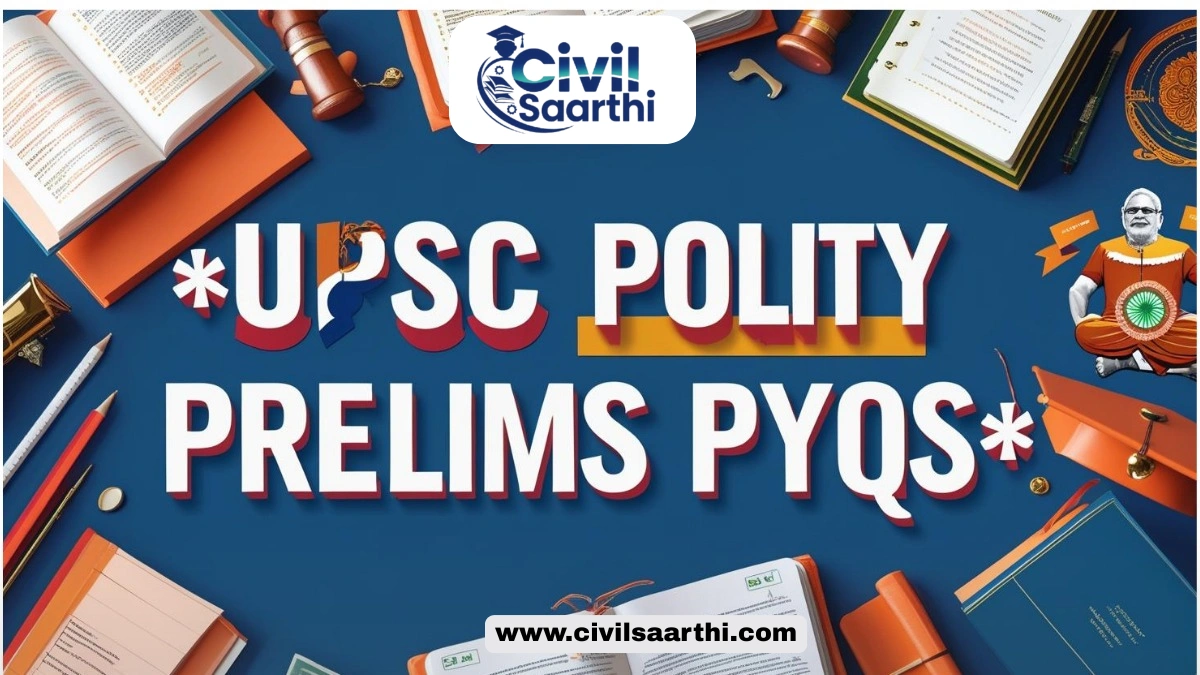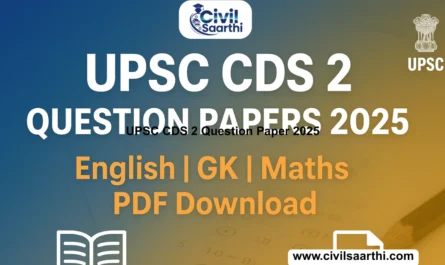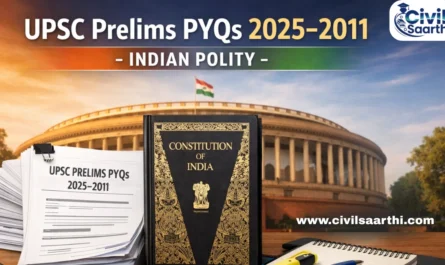UPSC Prelims Polity Topic-wise PYQs on DPSP and Fundamental Duties (2025 – 1995)
Q1. Under the Indian Constitution, concentration of wealth violates: [2021]
a) The Right to Equality
b) The Directive Principles of State Policy
c) The Right to Freedom
d) The Concept of Welfare
Ans b
Q2. Other than the Fundamental Rights, which of the following part(s) of the Constitution of India reflect the principles and provisions of the Universal Declaration of Human Rights (1948)? [2020]
- Preamble
- Directive Principles of State Policy
- Fundamental Duties
Select the correct answer using the code given below:
a) 1 and 2 only
b) 2 only
c) 1 and 3 only
d) 1, 2 and 3
Ans d
Q3. In India, Legal Services Authorities provide free legal services to which of the following types of citizens? [2020]
- Person with an annual income of less than Rs. 1,00,000.
- Transgender with an annual income of less than Rs. 2,00,000.
- Member of Other Backward Classes (OBC) with an annual income of less than Rs. 3,00,000.
- All Senior Citizens
Select the correct answer using the code given below:
(a) 1 and 2 only (b) 3 and 4 only
(c) 2 and 3 only (d) 1 and 4 only
Ans a
Q4. In India, separation of judiciary from the executive is enjoined by [2020]
(a) the Preamble of the Constitution
(b) a Directive Principle of State Policy
(c) the Seventh Schedule
(d) the conventional practice
Ans b
Q5. Which part of the Constitution of India declares the ideal of a Welfare State? [2020]
(a) Directive Principles of State Policy
(b) Fundamental Rights
(c) Preamble
(d) Seventh Schedule
Ans a
Q6. With reference to the provisions contained in Part IV of the Constitution of India, which of the following statements is/are correct? [2020]
- They shall be enforceable by courts
- They shall not be enforceable by any court
- The principles laid down in this part are to influence the making of laws by the State
Select the correct answer using the code given below:
a) 1 only
b) 2 only
c) 1 and 3 only
d) 2 and 3 only
Ans d
Q7. Consider the following statements: [2017]
With reference to the Constitution of India, the Directive Principles of State Policy constitute limitations upon
- Legislative function
- Executive function
Which of the above statements is/are correct?
a) 1 only
b) 2 only
c) Both 1 and 2
d) Neither 1 nor 2
Ans d
Q8. Which principle among the following was added to the Directive Principles of State Policy by the 42nd Amendment to the Constitution? [2017]
a) Equal pay for equal work for both men and women
b) Participation of workers in the management of industries
c) Right to work, education and public assistance
d) Securing living wage and human conditions of work to workers
Ans b
Q9. Which of the following statements is/are true of the Fundamental Duties of an Indian citizen? [2017]
- A legislative process has been provided to enforce these duties
- They are correlative to legal duties
Select the correct answer using the code given below:
- a) 1 only
- b) 2 only
- c) Both 1 and 2
- d) Neither 1 nor 2
Ans d
Q10. In the context of India, which one of the following is the correct relationship between Rights and Duties? [2017]
a) Rights are correlative with Duties
b) Rights are personal and hence independent of society and Duties
c) Rights, not Duties, are important for the advancement of the personality of the citizen
d) Duties, not Rights, are important for the stability of the State
Ans a
Q11. The idea of ‘Welfare State’ in the Indian Constitution is enshrined in its [2015]
a) Preamble
b) Directive Principle of State Policy
c) Fundamental Rights
d) Seventh Schedule
Ans b
Q12. Consider the following statements regarding the Directive Principles of State Policy: (2015)
- The principles spell out of the socioeconomic democracy in the country.
- The provisions contained in these Principles are not enforceable by any court.
Which of the statements given above is/are correct?
(a) 1 only (b) 2 only
(c) Both 1 and 2 (d) Neither 1 nor 2
Ans c
Q13. “To uphold and protect the Sovereignty Unity and Integrity of India” is a provision made in the: [2015]
a) Preamble of the Constitution
b) Directive Principles of State Policy
c) Fundamental Rights
d) Fundamental Duties
Ans d
Q14. In the Constitution of India, promotion of international peace and security is included in the: [2014]
a) Preamble to the constitution
b) Directive Principles of State Policy
c) Fundamental Duties
d) Ninth Schedule
Ans b
Q15. According to the constitution of India, which of the following are fundamental for the governance of the country? [2013]
- a) Fundamental rights
- b) Fundamental duties
- c) Directive principles of state policy
- d) Fundamental rights and fundamental duties
Ans c
Q16. Which of the following is/are among the Fundamental Duties, laid down in the Indian Constitution? [2012]
- To preserve the rich heritage of our composite culture
- To protect the weaker sections from social injustice
- To develop the scientific temper and spirit of inquiry
- To strive towards excellence in all spheres of individual and collective activity
Select the correct answer, using the codes below:
a) 1 and 2 Only b) 2 Only
c) 1, 3, and 4 Only d) 1, 2, 3 and 4
Ans c
Q17. Consider the following provisions under the Directive Principles of State Policy as enshrined in the Constitution of India: (2012)
- Securing for citizens of India a uniform civil code.
- Organizing village Panchayats.
- Promoting cottage industries in rural areas.
- Securing for all the workers reasonable leisure and cultural opportunities.
Which of the above are the Gandhian Principles that are reflected in the Directive Principles of State Policy?
(a) 1, 2 and 4 only (b) 2 and 3 only
(c) 1, 3 and 4 only (d) 1, 2, 3 and 4
Ans b
Q18. Which of the following provisions of the Constitution of India have a bearing on Education? [2012]
- Directive Principles of State Policy.
- Rural and Urban Local Bodies.
- Fifth Schedule
- Sixth Schedule
- Seventh Schedule
Select the correct answer using the codes given below:
(a) 1 and 2 only (b) 3, 4 and 5 only
(c) 1, 2 and 5 only (d) 1, 2, 3, 4 and 5
Ans d
Q19. Under the constitution of India, which one of following not a fundamental duty? [2011]
(a) To vote in public elections
(b) To develop the scientific temper
(c) To safeguard public property
(d) To abide by the Constitution and respect its ideals
Ans a
Q20. With reference to the Constitution of India, consider the following: [2010]
- Fundamental Rights.
- Fundamental Duties.
- Directive Principles of State Policy.
Which of the above provisions of the Constitution of India is / are fulfilled by the National Social Assistance Programme launched by the Government of India?
- a) 1 only b) 3 only
- c) 1 and 3 only d) 1, 2 and 3
Ans b
Q20. Which of the following is/are included in the Directive Principles of State policy? [2008]
- Prohibition of traffic in human beings and forced labour
- Prohibition of Consumption except for medicinal purposes of intoxicating drinks and of other drugs which are injurious to health
Select the correct answer using the code given below:
a) 1 Only
b) 2 Only
c) Both 1 and 2 Only
d) Neither 1 nor 2
Ans b
Q21. The purpose of the inclusion of Directive Principles of State Policy in the Indian Constitution is to establish: [2002]
a) Political democracy
b) Social democracy
c) Gandhian democracy
d) Social and economic democracy
Ans d
Q22. Which one of the following Articles of the Directive Principles of State Policy deals with the promotion of international peace and security? [2002]
a) 51 b) 48 A
c) 43 A d) 41
Ans a
Q23. The Swaran Singh Committee considered the question of: [1993]
- a) More autonomy to Punjab on the model of Jammu and Kashmir
- b) the suitability of the presidential form of government for India.
- c) the precedence of the Directive Principles over Fundamental Rights.
- d) administrative reforms
Ans c



